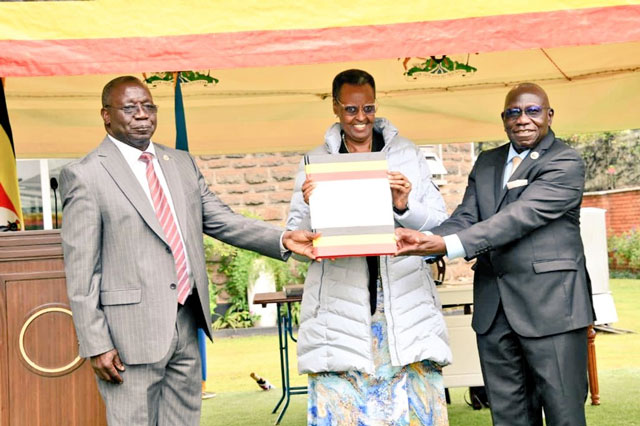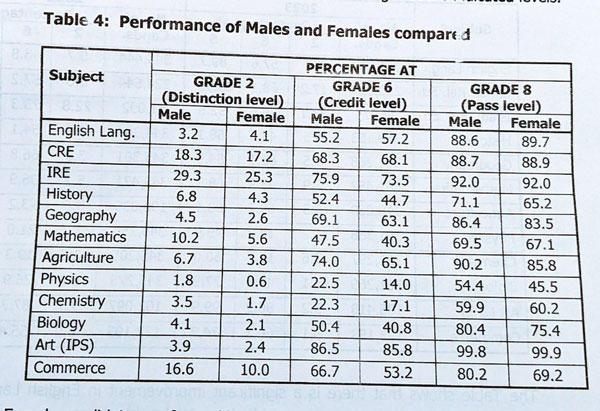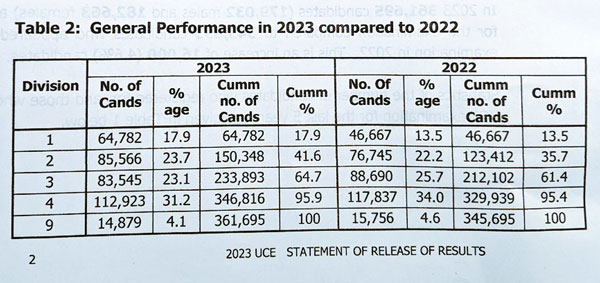
Kampala, Uganda | THE INDEPENDENT | The Uganda National Examinations Board ( UNEB) has today released the 2023 Uganda Certificate of Education (UCE) results, indicating a rise in performance in candidates scoring Division 1. There was a drop in failures, which means that 329,939 (95.9%) of learners who presented themselves for the examination can progress to the Post – UCE level.
The results show that 64,782 (17.9%) candidates of 361,695 candidates scored Division 1, up from 13.5% (46,667) the previous year.
In 2023, 364,469 candidates registered for the examination; 180,471 (49.5%) were male and female 183,998 (50.5%). Of these 361,695 candidates ( 279,032 males and 182,63) appeared for the examination.

Female candidates performed better than males in the English language. In other subjects, males performed better, with the differences being very significant in History, Geography, sciences and commerce.
UNEB stated that the performance in the sciences continues to be a cause for concern, with less than 20 per cent of the candidates obtaining Credit pass levels in Physics and Chemistry, and 40 per cent or more unable to pass. There was however an upturn in performance in Biology, which has been recording a steady decline.
These are the last results under the old curriculum. From the 2024 October and November examination, the UCE will be administered in accordance with the New Lower Secondary curriculum. The Ministry of Education is set to outline a strategy for transitioning from lower secondary to upper secondary under the new competence-based curriculum.

According to Dan Odongo, the Executive Director of UNEB, 346,816 out of 361,695 candidates who presented themselves in the 2023 examination have achieved results qualifying them to advance to the next educational level.
Additionally, 85,566 individuals, accounting for 23.7 percent, passed in Division Two, while 83,545 candidates, making up 23.1 percent, succeeded in Division Three. Furthermore, 112,923 learners, representing 31.2 percent, attained passing grades in Division Four.
In comparison to the previous year, Odongo highlighted a noteworthy improvement in English language, religious education, mathematics, and biology. However, there were noticeable declines in history, agriculture, and physics.
The performance in other subjects has remained relatively consistent. When commenting on the candidates’ work, Odongo observed a positive shift, noting a reduction in the practice of presenting memorized passages from texts in response to questions that demand original compositions in English language exams. This marks a departure from a long-standing trend that has persisted for decades.
A more in-depth examination of the results reveals that among subjects with a high number of registered candidates, Art (IPS) emerged as the top-performing subject, with an impressive 99.9 percent of its registered candidates achieving at least a pass eight.
Islam Religious Education-IRE and Christian Religious Education – CRE also demonstrated strong performance, with 92 percent and 88.95 percent of candidates passing, respectively. Additionally, IRE witnessed a notable number of candidates obtaining scores above distinction two. Another subject where candidates performed well is Agriculture, with 88.1 percent of those who registered for it successfully passing the examination.
Science Subjects Still Poorly Done, Slight Improvement in Biology
Odongo highlighted that the performance in science remains a cause for concern, particularly with less than 20 percent of the candidates attaining a credit pass level in physics and chemistry. Consistent with previous years, nearly half of the students who took the examination faced challenges in passing the science subjects.
On a positive note, Odongo pointed out an improvement in performance in biology, which had been experiencing a steady decline in previous years.
Despite substantial investments in the teaching and learning of science in Uganda over the years, these subjects have consistently yielded the poorest results at both the Uganda Certificate of Education (UCE) and Ugandan Advanced Certificate of Education (UACE) levels. Examination records from the past six years highlight Chemistry and Biology as the subjects with the lowest performance.
Each year, UNEB provides explanations for the recurring challenges faced by learners in these subjects, and the reasons persistently include a lack of knowledge on how to handle scientific apparatus, students’ inability to make and record observations or draw conclusions from them, difficulties in tabulating experimental results, and challenges in interpreting results to meet the requirements of the questions.
Furthermore, students continue to struggle with poor mathematical skills required for calculations. Many were found unable to accurately write symbols of elements, formulate compounds, and construct equations, among other issues. These persistent challenges have been reiterated each year, reflecting a recurring pattern in the difficulties faced by students in the science subjects.
While delivering her speech, Janet Kataaha Museveni, the Minister of Education and Sports, expressed her satisfaction with the improvement in biology performance. She credited this positive change to the collaborative efforts between UNEB, the Ministry, and the Association of Biology in Uganda.
However, Janet Kataaha Museveni cautiously acknowledged that she hoped the improvement was genuinely a result of these engagements and emphasized the need for sustainability. He pointed out that the current results, although showing improvement, have not yet reached satisfactory levels.
The minister also conveyed her joy over the improved results this year, as a larger number of learners are now qualified to progress to the next level of education compared to previous years.
While appreciating this positive development, she acknowledged that it raises crucial questions about what was done differently this time and what factors contributed to this trend. The minister emphasized the importance of understanding these drivers, as it would enable the ministry to sustain and enhance positive trends in learner achievement.
RELATED STORY
 The Independent Uganda: You get the Truth we Pay the Price
The Independent Uganda: You get the Truth we Pay the Price




Uce u0067/all
UCE U2548/all
Thanks to UNEB
wakya wewe
Hello